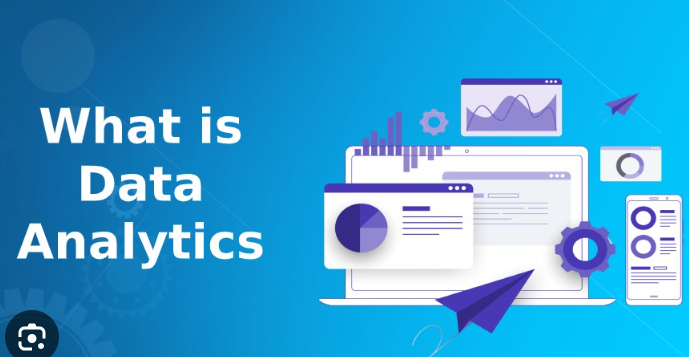What is the data analytics syllabus?
Data Analytics Classes in Pune Below is an inclusive sample syllabus widely utilized in university or professional certification courses


Data Analytics Classes in Pune Below is an inclusive sample syllabus widely utilized in university or professional certification courses



The short answer is: some parts of data analytics are competitive (particularly entry-level positions), but the market is not oversaturated—particularly if you're well-positioned.



Module 1: Introduction to Data Analytics



Speaking clearly in English requires practice and focus on pronunciation, pace, and confidence. Here are some key steps to improve your spoken English clarity:



Teaching English to beginners should be simple, fun, and interactive. Start with basic topics and gradually move to more advanced conversations.


Optimizing Java performance involves a combination of code optimization, efficient use of data structures, proper resource management, and tuning the Java Virtual Machine (JVM). Here are some key strategies and best practices for optimizing Java performance:


Java's popularity stems from a combination of technical strengths, extensive support, and a broad range of applications. Here are some key reasons why Java is so widely adopted and remains popular:



When learning Java, it's essential to cover a range of topics to build a solid foundation and become proficient. Here are the key topics to focus on:


Java's popularity can be attributed to several key factors that make it a preferred choice for developers and organizations:


Object-Oriented Programming (OOP) is a programming paradigm centered around objects rather than actions, and data rather than logic. Java, being an object-oriented language, uses OOP concepts extensively. Here are the key OOP concepts in Java: 1. Classes and Objects Class: A blueprint for creating objects. Defines a datatype by bundling data and methods that work on the data into a single unit. Object: An instance of a class. Represents a real-world entity with state (attributes) and behavior (methods). 2. Inheritance Inheritance: Visit For More Info - <a href="https://www.sevenmentor.com/java-course-in-nagpur">Java Classes in Nagpur</a> Mechanism where one class acquires the properties (fields) and behaviors (methods) of another class. Promotes code reusability. 3. Polymorphism Polymorphism: The ability of a variable, function, or object to take on multiple forms. Two types: Compile-time polymorphism (Method Overloading): Multiple methods with the same name but different parameters. Runtime polymorphism (Method Overriding): A subclass provides a specific implementation of a method already defined in its superclass. Visit For More Info - <a href="https://www.sevenmentor.com/java-course-in-nagpur">Java Course in Nagpur</a>


Java is a widely-used, object-oriented programming language that has several fundamental topics essential for beginners. Here are some of the basic topics in Java: 1. Introduction to Java History and Evolution: Understanding the origins and development of Java. Features of Java: Platform independence, object-oriented, simple, secure, etc. Java Environment: JDK (Java Development Kit), JRE (Java Runtime Environment), and JVM (Java Virtual Machine). 2. Basic Syntax Java Program Structure: Understanding the structure of a Java program including the main method. Data Types: Primitive data types (int, char, double, boolean, etc.) and non-primitive data types (arrays, strings, classes). Variables: Declaration, initialization, and scope of variables. Operators: Arithmetic, relational, logical, bitwise, assignment, and other operators. 3. Control Flow Statements Conditional Statements: if, if-else, switch. Looping Statements: for, while, do-while loops. Branching Statements: break, continue, return.



Java, as a widely-used programming language, offers numerous advantages that make it a popular choice for many types of software development. Here are some of the key advantages of Java: Platform Independence: Java's "Write Once, Run Anywhere" (WORA) capability is one of its most significant advantages. Java programs can run on any device that has the Java Virtual Machine (JVM) installed, regardless of the underlying hardware and operating system. This is due to Java's bytecode, which is platform-independent. Object-Oriented: Java is inherently object-oriented, which promotes code modularity, reusability, and flexibility. Object-oriented principles such as inheritance, polymorphism, and encapsulation help in managing large codebases and improve maintainability. Robust and Secure: Java is designed to be robust with strong memory management and exception handling. Its security features, such as bytecode verification, sandboxing, and the lack of explicit pointers, help in developing secure applications. Rich Standard Library: Java comes with a comprehensive standard library (Java Standard Edition - SE), which provides a wide range of functionalities. This extensive set of libraries supports networking, data structures, algorithms, and more, reducing the need for external dependencies. Multithreading Support: Java has built-in support for multithreading, which allows developers to write programs that can perform multiple tasks simultaneously. This is particularly useful for developing responsive and high-performance applications. Automatic Memory Management: Java features automatic garbage collection, which helps manage memory efficiently and reduces the likelihood of memory leaks. Developers are freed from manual memory management, reducing the risk of errors. Strong Community and Ecosystem: Java has a large and active community, which means abundant resources, libraries, frameworks, and tools are available. Community support is readily accessible through forums, documentation, and user groups. Versatility and Scalability: Java is used in a wide range of applications, from mobile apps (Android) to enterprise-level applications, web applications, and even scientific computing. Its scalability ensures that it can handle both small and large-scale applications effectively. Mature Development Tools: Java is supported by mature and powerful Integrated Development Environments (IDEs) such as IntelliJ IDEA, Eclipse, and NetBeans. These tools offer advanced features like code completion, debugging, and refactoring, which enhance productivity. Backward Compatibility: Java maintains a strong focus on backward compatibility, ensuring that older versions of applications can run on newer JVMs without modification. This protects investments in existing codebases. Extensive Documentation and Tutorials: The extensive official documentation, along with numerous tutorials and guides available online, https://www.sevenmentor.com/java-training-classes-in-pune.php


Choosing a research topic in data science involves considering various factors, including your interests, expertise, available resources, and the potential impact of your research. Here are some steps to help you choose a research topic: Identify your interests: Start by exploring areas of data science that genuinely interest you. Are you passionate about machine learning, natural language processing, computer vision, or another subfield? Consider what topics within data science excite you the most. Assess your expertise: Evaluate your background, skills, and knowledge in different areas of data science. Choose a research topic that aligns with your expertise while also allowing you to expand your skills and learn new concepts. Review current trends and challenges: Stay updated on the latest trends, challenges, and advancements in data science. Look for gaps in existing research or areas where further exploration is needed. Consider how your research can contribute to addressing these gaps or challenges. Consider practical applications: Think about the practical applications of your research. How can your findings be applied to real-world problems or industries? Research with practical applications often has more significant impact and relevance. Evaluate feasibility and resources: Consider the feasibility of your research topic in terms of available resources, data availability, computational requirements, and time constraints. Choose a topic that you can realistically pursue given your available resources and constraints. Seek input and feedback: Discuss potential research topics with peers, mentors, professors, or professionals in the field. They can provide valuable insights, feedback, and suggestions to help you refine your ideas and identify promising research directions.



Data science offers a plethora of benefits across diverse sectors and applications. Here are some of the key benefits: Informed Decision Making: Data science empowers organizations to make informed decisions by extracting insights from large volumes of structured and unstructured data. This leads to more accurate, strategic, and data-driven decision-making processes. Improved Efficiency and Productivity: By automating repetitive tasks, optimizing processes, and streamlining operations, data science enhances efficiency and productivity within organizations. This frees up valuable time and resources for focusing on core business activities. Predictive Analytics: Data science techniques such as machine learning and predictive modeling enable organizations to forecast future trends, outcomes, and behaviors based on historical data patterns. This helps in anticipating market changes, customer preferences, and business risks. Cost Reduction: Data science aids in identifying cost-saving opportunities, optimizing resource allocation, and reducing operational expenses. By eliminating inefficiencies and waste, organizations can achieve significant cost reductions and improve profitability. Personalization and Customization: Data science enables personalized recommendations, targeted marketing campaigns, and customized products or services based on individual preferences, behaviors, and demographics. This enhances customer satisfaction, engagement, and loyalty. Risk Management: Data science plays a crucial role in identifying, assessing, and mitigating risks across various domains such as finance, insurance, and cybersecurity. By analyzing historical data and predicting future outcomes, organizations can proactively manage risks and minimize potential losses. Innovation and Competitive Advantage: Data science fosters innovation by unlocking insights, identifying opportunities, and driving product or service innovation. Organizations that leverage data science effectively gain a competitive edge in the market by delivering innovative solutions and staying ahead of competitors. Real-time Insights and Decision Making: Data science enables real-time data analysis and monitoring, allowing organizations to respond promptly to changing market conditions, customer needs, and emerging trends. This agility is essential for making timely decisions and seizing opportunities as they arise. Enhanced Customer Experience: By analyzing customer data and feedback, organizations can gain a deeper understanding of customer needs, preferences, and sentiments. Data science enables organizations to deliver personalized experiences, improve customer satisfaction, and build long-term relationships with customers. Scientific Research and Discovery: In fields such as healthcare, genetics, and environmental science, data science accelerates scientific research and discovery by analyzing large datasets, identifying patterns, and uncovering new insights. This contributes to advancements in knowledge, innovation, and human welfare. Visit - https://www.sevenmentor.com/data-science-classes-in-nagpur



The benefits and importance of spoken English are significant and can impact various aspects of personal, academic, and professional life. Here are some key points highlighting the advantages: Global Communication: English is widely used as a global language, enabling communication with people from diverse linguistic backgrounds. Proficient spoken English facilitates international collaboration and understanding. Career Advancement: Strong spoken English skills are often a prerequisite for many job opportunities. Employers value effective verbal communication in interviews, presentations, meetings, and day-to-day workplace interactions. Business and Professional Settings: In the business world, effective communication is crucial. Spoken English proficiency enhances your ability to negotiate, network, and engage in professional discussions. Academic Success: Good spoken English is essential for academic achievement. It aids in participating in class discussions, presenting research, and communicating with professors and peers. Confidence Building: Improving spoken English boosts confidence. The ability to articulate thoughts and ideas clearly enhances self-esteem, making individuals more comfortable in various social and professional situations. Social Interaction: Clear spoken English facilitates meaningful social interactions. It allows individuals to express themselves, build connections, and engage in conversations with people from different cultural backgrounds. Cultural Enrichment: Proficient spoken English provides access to a wealth of literature, media, and cultural expressions. It allows individuals to engage with diverse cultural perspectives and broaden their understanding of the world. Enhanced Travel Experience: English is commonly used in international travel. Strong spoken English skills make it easier to navigate unfamiliar environments, communicate with locals, and fully enjoy travel experiences. Networking Opportunities: Effective verbal communication is a valuable asset in networking. Strong spoken English allows individuals to establish and maintain connections, which can lead to personal and professional opportunities. Increased Opportunities for Learning: Proficient spoken English opens doors to a vast array of educational resources, online courses, and global knowledge-sharing platforms, contributing to continuous learning and personal development. Critical Thinking and Problem-Solving: The ability to express thoughts verbally contributes to critical thinking and effective problem-solving. Clear communication aids in analyzing complex issues and collaborating on solutions. Enhanced Presentation Skills: Spoken English proficiency is essential for delivering compelling presentations. It enables individuals to convey information in a structured and engaging manner. In conclusion, the benefits and importance of spoken English extend across various aspects of life, impacting career prospects, educational achievements, cultural engagement, and personal development. Strengthening spoken English skills is an investment in effective communication, fostering success and enriching life experiences. https://www.sevenmentor.com/spoken-english-classes-in-kolhapur



A Java full-stack developer is expected to have a broad range of skills, spanning both front-end and back-end development, along with other related concepts. Here are the key concepts covered in the role of a Java full-stack developer:
